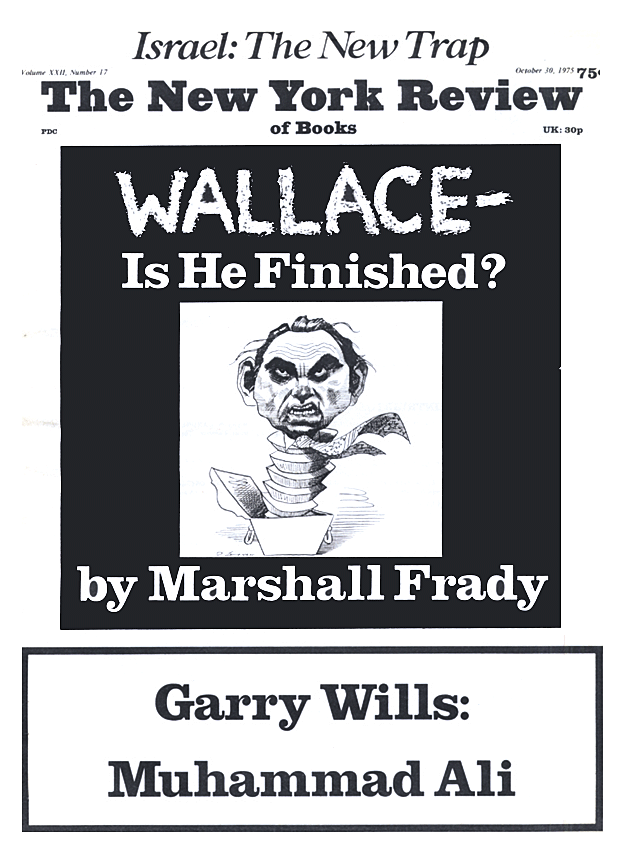In response to:
Prosecution Witnesses from the September 18, 1975 issue
To the Editors:
Helene Muchnik’s [sic] review [NYR, September 18] of my book The Education of Lev Navrozov is a stimulating study in creative sterility out to destroy blindly whatever endangers its stock of clichés.
My book, the first of my cycle, has, understandably, outraged Ms. Muchnik. I “insult mankind,” mine is “hardened cynicism,” I “impute baseness” even to Maya-kovsky, called the “greatest poet of the Soviet era” in Soviet propaganda—and in many Western studies.
In fact, Ms. Muchnik’s article “Larger Than Life—Mayakovsky” is based on very pretty clichés from Soviet school textbooks, mostly 40 years old. These 40-year-old cliché raptures have been happily running into a new edition almost every year ever since 1963, and here escapes from Russia a certain “hardened cynic” Navrozov with his books in which he describes how the “larger-than-life poet” was a ruthless hack, machinegunning his propaganda doggerel at a fantastic speed to grab as much money as he could. No wonder my “tone” is “offensive” to Ms. Muchnik, I “deride ideals,” I have no “sense of human worth.”
Typically, three quarters of Ms. Muchnik’s review is what is called in Soviet schools “retelling of the book in a pupil’s own words,” and only one quarter is a string of insults without a single proof or example to support any of them. The “retelling” is at best an absolute void, for on her own, without the benefit of previously stocked clichés, Ms. Muchnik can perceive or understand nothing original (predictably for anyone familiar with her studies). Now, which is more damning for a book than an absolute void shown to the reader?
After the absolute void, the string of gratuitous insults is, indeed, even somehow refreshing. “Neither intellectually nor emotionally” am I equal to the “complex, majestic theme of Russia.” Emotionally I am not. “Complex, majestic theme of Russia”! I could platitudinize like that (rather badly) in my 2nd-Grade essays. But I have long since lost the emotional knack. Yet my emotional deficiency is only half of my handicapped condition. History “demands meticulous study,” Ms. Muchnik edifies. In her “retelling,” Ms. Muchnik managed to confuse the anthropologist Lévy-Bruhl and his modern antipode Lévi-Strauss. She has neglected to look up two “similar” names in three months. And yet she sermonizes on the need for “meticulous study,” and she has allegedly managed to detect in my book the total absence of the “necessary objectivity and patience.”
In my book I say that perhaps I am as evil as Stalin, and have done less evil simply because I never had such opportunities to do evil as he had. I am from a world of moral abysses in which I feel I may slip and fall and never stop. If Ms. Muchnik is from a hermetic moral planet on which everything is as pure and sweet as textbook clichés, surely she should have passed a hardened cynic’s book to someone else to review? Surely some Americans might want to know something about some abysmal Russian cynics like myself and their perception of Russia and the world, once such English-speaking monsters manage anyway to escape from Russia once in 58 years? Or is Ms. Muchnik called upon to guard American purity and nip the English-speaking Russian cynics in the bud, especially so since “established American experts” like Ms. Muchnik, with their titles, posts, grants, salaries, connections, can nip in the bud quite safely and easily these hardened cynics who manage occasionally to escape from Russia, penniless and unknown.
Chekhov ridiculed the little dirty trick of comparing an author who had just published his first work with someone whose name figured, rightly or wrongly, in all textbooks: “Say what you like, but Chekhov cannot match Boborykin.” Ms. Muchnik repeats the trick almost a century later. Allegedly, I aspire to be a Gogol or a George Orwell, but have “failed to emulate the seriousness that underlies their work.” So I am not, basically, as serious as Gogol or Orwell, see? What other qualities of other textbook greats have I “failed to emulate”? The intensity of Shakespeare? Or the leisuredness of Homer?
The dramatism of Pasternak I “failed to emulate” quite definitely, according to Ms. Muchnik: my writing is not such as “in Pasternak’s words, can ‘make the heart stop beating.’ ” But if Pasternak wrote such heart-stop-beating commonplaces as Ms. Muchnik ascribes to him, what is the point of “emulating” him, even if I wanted to “emulate” anyone?
What a dreary provincialism, Mr. Editor. The whole review, including this “quotation from Pasternak.” Makes the heart stop beating indeed. It is not any literary or intellectual sensibilities I expect under the circumstances. But just a bit of ordinary humor. Some common sense perhaps too. And common decency, Sir.
Lev Navrozov
This Issue
October 30, 1975


